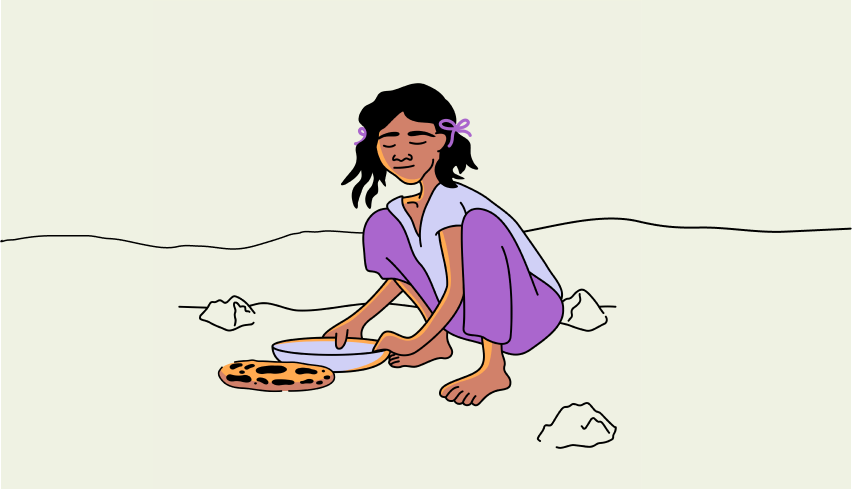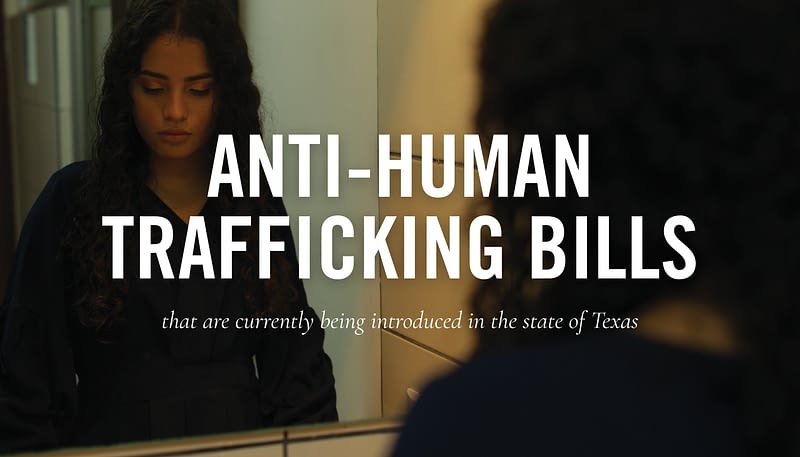The following bills represent the collaborative work of nonprofits, government organizations, and politicians. With the victim-centered approach, the following bills have the power to bring real aid to those who need it most. Want to get involved? Call your local representative and ask them to pass these bills!
89th Legislative Session: Anti-Human Trafficking Bills
SB 196 (Menendez). Mandates the development of instructional modules and training for public schools on the prevention of sexual abuse and sex trafficking.
SB 389 (Middleton). Establishes an Anti-Human-Trafficking Intelligence Center within the Texas Department of Licensing and Regulation to coordinate law enforcement and governmental responses to human trafficking. serving as the state’s primary hub for detecting, preventing, and responding to trafficking-related criminal activities. The Center will collaborate with various agencies and organizations, maintain confidential information, provide training and public outreach, and submit annual reports detailing trafficking statistics and operational plans. with funding available through gifts, grants, and donations, though not from license holders.
SB 535 (Huffman), Limits the admissibility of evidence regarding a victim’s past sexual behavior in prosecutions of certain trafficking. sexual, or assaultive offenses.
SB 610 (Paxton)/HB 589 (Thompson), Creates a new anti-trafficking unit within the Department of Licensing and Regulation to identify businesses in regulated industries affected by human trafficking and coordinate with law enforcement and NGOs. The legislation empowers the commission to establish anti-trafficking rules and protocols for inspections and investigations, while mandating collaboration with the attorney general’s office and other agencies. The bill also strengthens victim protection by making identifying information confidential and exempt from disclosure, allowing the department to withhold such information without attorney general approval.
SB 703 (Zoffirini), Prohibits a person from obtaining a mas,sage school, therapist, or establishment license if they have been convicted of trafficking, sexual assault, solicitation of prostitution, sexual abuse, and 18 other sexual offenses. It also makes it easier to revoke existing licenses for violations of human trafficking and prostitution laws.
SB 741 (Huffman)/HB 1778 (Thompson), Addresses human trafficking, prostitution, child pornography, and the prosecution of sexual or assaultive offenses, including the failure to stop or report those offenses. Strengthens anti-trafficking measures by expanding the state’s human trafficking council to include the Office of Court Administration and requiring trafficking awareness training for tattoo, piercing, and cosmetology professionals. The legislation creates stricter penalties for trafficking offenses, particularly those involving minors or disabled individuals, while establishing a new felony offense of “Continuous Promotion of Prostitution.” The bill extends statutes of limitations for sexual offenses and introduces a third-degree felony charge for failing to report child assault.
SB 835 (Paxton) Prohibits the enforceability of nondisclosure agreements for conduct that falls under certain sexual offenses against a child, including trafficking.
SB 836 (Paxton)/H B 1686 (Hull), Strengthens privacy protections for victims of sex offenses and human trafficking by limiting access to victim-related materials, property, and personal information, helping ensure their safety during recovery.
SB 941 (Paxton)/HB, 451 (Thompson), Requires children entering state conservatorship to undergo screenings for risk of commercial sexual exploitation within 45 days, using a validated tool. The legislation also requires juvenile probation departments to conduct similar risk assessments before case disposition, establishing a standardized approach to identifying and protecting vulnerable youth across agencies.
SB 955 (Parker) Enhances penalties for traffickers who recruit from correctional facilities.
HB 179 (Johnson), Eliminates the time limits for filing personal injury lawsuits related to offenses against a child, including sexual assault of a child, aggravated sexual assault of a child, continuous sexual abuse of a child under 14, sexual trafficking of a child, compelling prostitution by a child, and indecency with a child.
HB 372 (Thompson), Changes the definition of duress to be a reasonable person in the situation the defendant. This would allow jurors to put themselves in the position of a survivor.
HB 491 (Thompson), Ensures that civil penalties for violations of laws regulating massage therapy under Chapter 455 of the Texas Occupations Code return to the locality. This incentivizes and empowers local attorneys to bring civil suits against illicit massage businesses that serve as fronts for human trafficking and allows them to garner the profits that otherwise drive the human trafficking industry.
HB 539 (Thompson), Expands orders of nondisclosure to cover additional non-violent past convictions that often plague survivors of human trafficking. These orders of nondisclosure allow human trafficking survivors to start over without the stigma and limitations of a criminal record for crimes that were beyond their control.
HB 742 (Thompson), Requires human trafficking prevention training for first responders and protection for employees who report trafficking.
HB 754 (Thompson). Requires human trafficking prevention training for medical assistants and protection for employees who report trafficking.
HB 908 (Spiller), Requires law enforcement agencies to report missing children to the National Center for Missing and Exploited Children within 2 hours of receiving the report.
HB 1732 (Hernandez), Ensures a person would become ineligible for a license as a massage establishment, massage school, massage therapist, or massage therapy instructor if they have been convicted of, pleaded nolo contendere or guilty to, or received deferred adjudication for sexual assault, indecent assault, or aggravated sexual assault. It also streamlines the process of revoking licenses if an individual has been convicted or pleaded no contest to human trafficking and certain prostitution related offenses.






